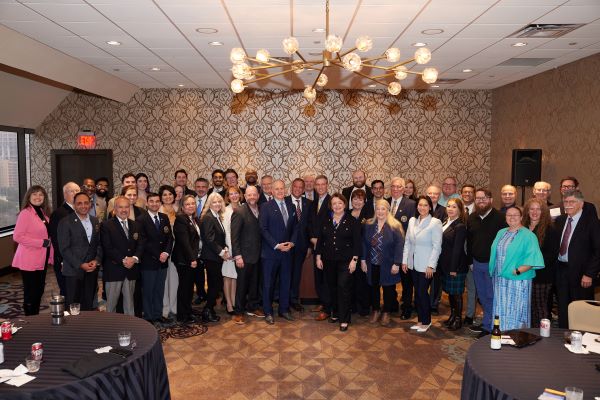
Loud, abrasive. Direct but nice about it. Let the stars shine. Laughter, equanimity, servanthood. Empathy.
Those responses and others were scrawled onto a smattering of fluorescent Post-its affixed to a corkboard at the Texas Medical Association’s recent Business of Medicine Conference. They came in response to a prompt directing attendees to describe their leadership style in five words or less at a Small Talks coffee break.
Arathi Shah, MD, a 13-year TMA member who attended the session, likened such offerings to “the stabilizer of a ship,” saying they keep her grounded amid the pressures of life, including a couple of uprooting moves as Dr. Shah’s family traversed the state.
She herself was sponsored early in her career by the Dallas County Medical Society to attend the TMA Leadership College (TMALC), a selective, application-based leadership development program for members in their first eight years of practice post-residency/fellowship. The newest addition to TMA’s suite of leadership resources, the Lifelong Leadership Program (LLP), is an open enrollment, self-paced curriculum designed for busy, experienced physicians looking to grow their leadership skills.
As a graduate of TMALC, Dr. Shah now serves as secretary of TMA’s International Medical Graduate section, a leadership position she’s taken on in addition to being a physician and parent. She joins over 200 alumni of the 13-year-old flagship leadership development program.
“Our goal with these programs is to give physicians the skills they need to lead however they want to lead, whether that’s within organized medicine, within their own individual practice, within their hospital system, or within their community,” said Melanie Fossett, TMA leadership development program manager.
Both initiatives seek to ensure strong and sustainable physician leadership within organized medicine. The training paves the way for alums to participate in leadership roles on TMA boards, councils, committees, and member sections. In these roles, they can help shape the trajectory of Texas medicine and guide decision-making that affects physicians and patients.
The haiku-like contributions on the coffee break corkboard, for instance, gestured at concepts embedded in titles on the TMALC suggested reading list, which spans a Pulitzer-finalist memoir, musings on mortality, Malcolm Gladwell, and a handful of TED Talks (tma.tips/LeadershipReading).
“It is a continual work in progress,” Ms. Fossett said of the list, which informs projects undertaken by scholars, as participants in the Leadership College are known. Scholars can select a book from the suggested list or one of their own choosing.
A similar focus on growth and expansion, for the betterment of physicians and medicine at large, underpins the LLP, which launched last year and counts some two dozen current enrollees, Dr. Shah now among them.
Developing a leadership pipeline not just for young physicians but also for more seasoned members of TMA is exciting and of a piece with the intellectual rigors of the profession, Ms. Fossett says.
“Doctors are lifelong learners; that comes with the territory,” she said.
Jessica Ridge
Reporter, Division of Communications and Marketing
(512) 370-1395